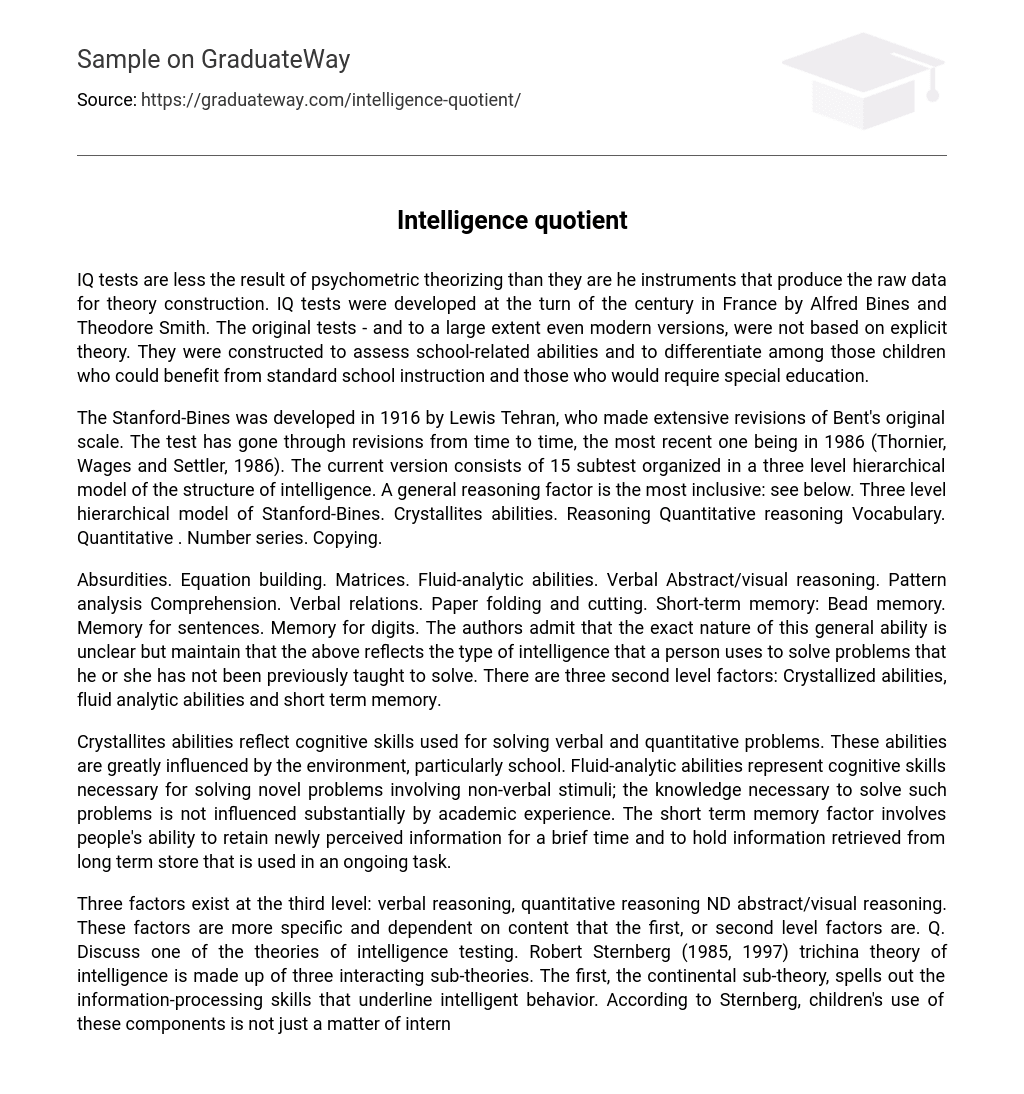IQ tests are less the result of psychometric theorizing than they are he instruments that produce the raw data for theory construction. IQ tests were developed at the turn of the century in France by Alfred Bines and Theodore Smith. The original tests – and to a large extent even modern versions, were not based on explicit theory. They were constructed to assess school-related abilities and to differentiate among those children who could benefit from standard school instruction and those who would require special education.
The Stanford-Bines was developed in 1916 by Lewis Tehran, who made extensive revisions of Bent’s original scale. The test has gone through revisions from time to time, the most recent one being in 1986 (Thornier, Wages and Settler, 1986). The current version consists of 15 subtest organized in a three level hierarchical model of the structure of intelligence. A general reasoning factor is the most inclusive: see below. Three level hierarchical model of Stanford-Bines. Crystallites abilities. Reasoning Quantitative reasoning Vocabulary. Quantitative . Number series. Copying.
Absurdities. Equation building. Matrices. Fluid-analytic abilities. Verbal Abstract/visual reasoning. Pattern analysis Comprehension. Verbal relations. Paper folding and cutting. Short-term memory: Bead memory. Memory for sentences. Memory for digits. The authors admit that the exact nature of this general ability is unclear but maintain that the above reflects the type of intelligence that a person uses to solve problems that he or she has not been previously taught to solve. There are three second level factors: Crystallized abilities, fluid analytic abilities and short term memory.
Crystallites abilities reflect cognitive skills used for solving verbal and quantitative problems. These abilities are greatly influenced by the environment, particularly school. Fluid-analytic abilities represent cognitive skills necessary for solving novel problems involving non-verbal stimuli; the knowledge necessary to solve such problems is not influenced substantially by academic experience. The short term memory factor involves people’s ability to retain newly perceived information for a brief time and to hold information retrieved from long term store that is used in an ongoing task.
Three factors exist at the third level: verbal reasoning, quantitative reasoning ND abstract/visual reasoning. These factors are more specific and dependent on content that the first, or second level factors are. Q. Discuss one of the theories of intelligence testing. Robert Sternberg (1985, 1997) trichina theory of intelligence is made up of three interacting sub-theories. The first, the continental sub-theory, spells out the information-processing skills that underline intelligent behavior. According to Sternberg, children’s use of these components is not just a matter of internal capacity.
It is also a function of the condition under which intelligence is assessed. The experimental sub-theory states that highly intelligent individuals, compared to less intelligent ones, process information more skillfully in novel situation. When given a new task, the bright person learns rapidly, making strategies automatic so working memory is freed for more complex aspects of the situation. To accurately compare children in brightness – in ability to deal with novelty and learn efficiently – all children would need to be presented with equally unfamiliar test items.
Otherwise some children will appear more intelligent than there simply because of their past experiences, not because they are really more cognitively skilled. The contextual sub-theory proposes that intelligent people skillfully adapt their information-processing skills to fit with their personal desires and the demands of their everyday worlds. When they cannot adapt to a situation, they try to shape, or change it to meet their needs. If they cannot shape it, they select new concepts that are consistent with their goals. The contextual sub-theory emphasizes that intelligent behavior is never culture free.
Because of their backgrounds, some children come to value behaviors squired to success on intelligence tests, and they easily adapt to the tasks and testing conditions. Others with different life histories misinterpret the testing context or reject it entirely because it does not suit their needs. Many scientists, psychologists, educators and members of the general public challenge the concept of a “general” intelligence which is universally representative of intelligence levels and measurable by simple verbal and logical skills.
They feel that tests do not take into account influences from genetics, cultural and social background, even personality of the test taker. There is also debate whether intelligence is a fixed quantity that can be measured and whether it actually encompasses a broader conception than what is measured in IQ tests, i. E – the tests only measure a part of what is commonly understood as “intelligence”. Everyone has unique strengths and weaknesses in different areas, whereas these tests tend to over-emphasis the general ability. Several psychologists believe that there are multiple intelligences which cannot be measured.
Standard tests are often inappropriate for children with mental development robbers such as autism, since the skill measured (e. G adaptive) are poor indicators of intelligence in such children and have resulted in the incorrect assumption that most children with autism are retarded. Conclusion: While there has been considerate debate over the exact nature of intelligence, no definitive conceptualization has emerged. Today, psychologists often account for the many different theoretical viewpoints when discussing intelligence and acknowledge that this debate is ongoing.





